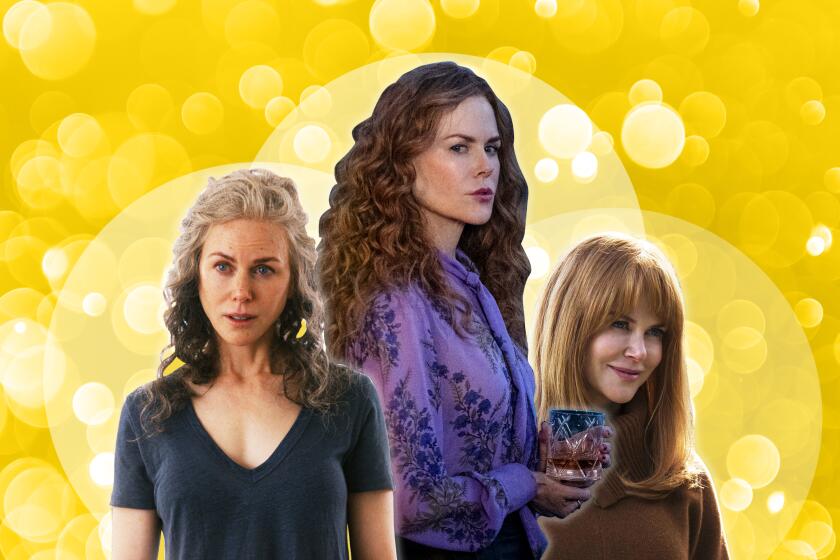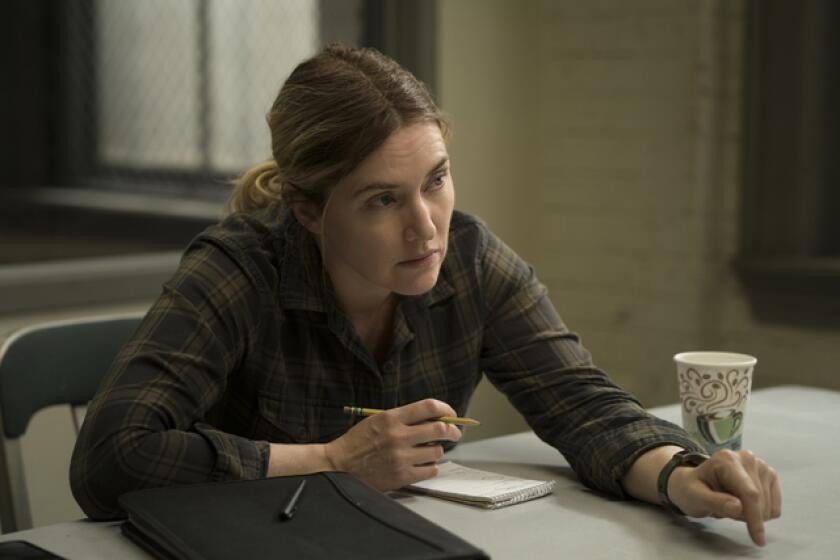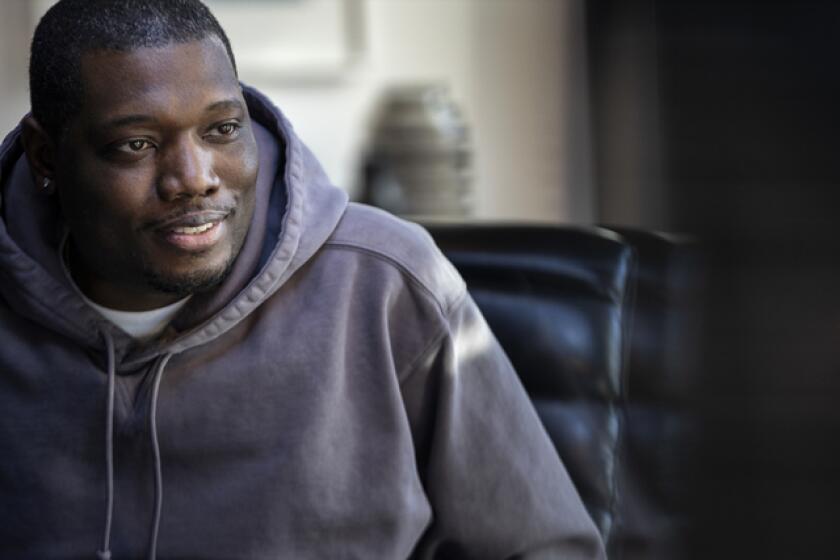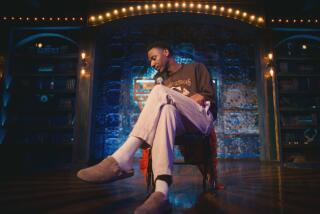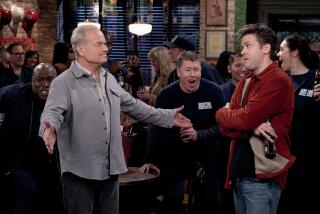Introducing your next binge: A show about stand-up where the comedy isn’t the point
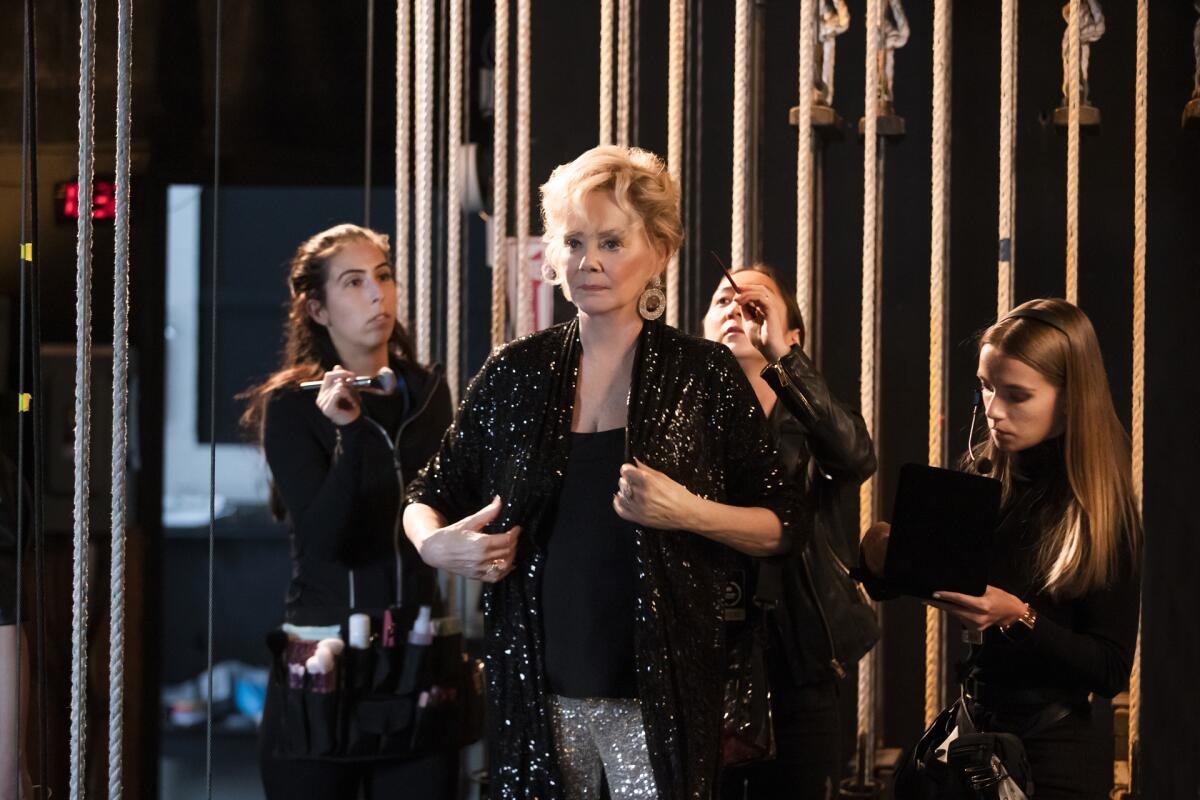
In “Hacks,” a new series from HBO Max, Jean Smart plays a Las Vegas-based comedian at the dawn of the twilight of her career, who — by the will of series creators Paul W. Downs, Lucia Aniello and Jen Statsky — reluctantly hires a young comedy writer (Hannah Einbinder) who is facing what might be the end of hers.
Is it Your Next HBO (Max) Binge, as headline writers like to write? After watching just the first couple of episodes I would have said, “Maybe not? How much do you like Jean Smart?” But after the six available for review, out of 10, I would say, “Why not?” (Especially if you do like Jean Smart, who co-stars in Your Current HBO Binge, “Mare of Easttown.”) I would also note that after spending much of this century as a haven for stories about difficult dudes, HBO and now HBO Max have become an avenue for shows with strong female leads and points of view — “The Undoing,” “Big Little Lies,” “Euphoria,” “Insecure,” “A Black Lady Sketch Show,” “The Flight Attendant,” “Made for Love,” and I could go on — and that my editor will likely ask for an essay on that subject now that he’s read this sentence.
For the record:
10:38 a.m. May 17, 2021An earlier version of this story indicated Vance was prepared to spend $10,000 for a salt shaker. The item was a pepper shaker.
Smart plays Deborah Vance, comedy legend. Once upon a time she was on the cover of Time and starred in a sitcom with her husband, who left her for her sister. That Deborah is supposed to have burned down his house — gossip taken as gospel, but nothing that resulted in a charge of arson — has not exactly ruined her. She lives in a home that is big enough to contain half a dozen others, owns a private plane, is prepared to spend $10,000 for a pepper shaker, has set a Vegas performance record and is about to have a street named after her (“It’ll probably be a dead end with an abortion clinic on it”). Her luxury bath caddies sell out on QVC. But if it hasn’t derailed her career, it might have sidetracked it: The implication, conveyed by some especially well-done facsimiles of old magazines and video clips, is that without the fire — which has stuck to her like gum on a high heel — she might have been Jay Leno rather than just being on “Jay Leno.”
Ava (Einbinder) has become professionally toxic on account of a tweet about a “closeted senator who’s sending his son to conversion therapy camp, or whatever.” (That is not the joke, which, when we hear it, is not a good joke or, in terms of the story, supposed to be.) Twenty-five years old, she has been cast out of the writers room on a hit show, and no one seems interested in gathering her in, given an attitude of entitlement and a greater capacity to be offended than to take direction; her alienated old friends regard her as “a career-obsessed opportunist.” A Hollywood type.
Since “Big Little Lies,” the Oscar winner has brought prestige to a medium eager for it — and inspired a wave of stories about affluent women on the verge.
Ava is in the office of her agent, Jimmy (Downs), bemoaning her state — “I’m sorry if I was unfiltered and honest or whatever but that’s literally what people like about my writing. Now all of a sudden it’s a problem? — when Deborah, who he represents as well, calls with complaints of her own. The owner of the casino where she is in residence (Christopher McDonald) wants her to surrender Friday and Saturday nights so he can book Pentatonix: “They do medleys. They won the ‘Sing-Off.’”
Jimmy manages more or less to trick them into a meeting, mostly to get them out of his hair, and Ava flies to Las Vegas where she pays Deborah some vague, insincere compliments without knowing her work at all. As passive-aggression turns to mere aggression, she compares her host’s house to the Cheesecake Factory and calls her a “classist monster.” But after some barbed back-and-forth and a chase down Deborah’s long driveway, the veteran hires the tyro. “Write me 20 jokes before tomorrow morning,” Deborah declares, before disappearing back up the drive, “and nothing about pantyhose or the Challenger explosion — I’ve done them all.”
In classic Screenwriters Textbook style, they do not like one another at first; eventually, they will begin to thaw, but until they do, watching the show can feel a little frustrating, as if it’s failing a mission whose orders are not clear. What are we learning here, other than that it’s a drag getting old or that young people can be arrogant both about what they know and what they don’t think is worth knowing? I was disgruntled for a while, I must admit, and kept measuring plot points for plausibility. But it opens like a flower into a story of loneliness and love.
Deborah has employees, who make a kind of family, most notably her gyroscopically even-keeled COO and factotum Marcus, played by Carl Clemons-Hopkins. (He’s an important enough character that we’ll meet his mother.) She has fans, who consider her family, and knows the backstage crew by name. And Corgis. And an actual daughter, DJ (Kaitlin Olson, from “It’s Always Sunny in Philadelphia”), who is trying to find herself at 40, and whom Deborah treats with care that looks like criticism. But she is basically alone in her enormous house, as Ava is alone in the crowded hotel where she’s living.
The “accent nerd” went to extraordinary lengths to sound like a Pennsylvania native for HBO’s “Mare of Easttown.” Here’s how she did it.
Of the two of them, Deborah seems the wiser, if only by seniority, though we are treated to enough shots of Smart out of makeup and looking tired to sense that she has something to learn. I’m sure there are viewers of Ava’s age who will look at this as the story of some old lady giving a hard time to a cool girl just because she’s young. But each has sacrificed life for a career, and it seems possible, averaging out other stories about people who need people, that what they’ll build between them is not work but a life.
Deborah’s luxurious circumstances aside, she’s not a diva but a hard worker who’s up early taking care of business(es). She’ll open a pizza parlor, because “a gig’s a gig” and the money is ridiculous; she’ll hop onto a tourist bus and do schtick to fill what might otherwise be an empty afternoon. She treats her staff well. Perhaps Ava is the diva, a comedy snob who disdains “writing jokes for a bunch of Panera people.” (“You’re telling me that if a lot of people think it’s funny, it’s not?” Deborah counters.)
Comedy itself is only occasionally the subject and when it is discussed, it’s as a philosophical reflection of their generational difference. Deborah’s act includes jokes like, “I wouldn’t say I’m alcoholic, I’d slur it.” Ava offers her the joke, “I had a horrible nightmare that I got a voice mail,” which Deborah cannot recognize as one. And once the older woman opens up about her life, Ava, for whom truth is comedy and comedy truth, begs her to “talk about all this in your act, all of it.”
“No one wants to hear me complain about the past,” Deborah objects. “People think it’s highbrow now to tell sad stories … but it’s not funny.”
“That Damn Michael Che” falls into several of the same comic traps as “SNL” has under the leadership of Che and “Weekend Update” co-anchor Colin Jost.
If Smart isn’t entirely convincing as a stand-up comic — I go back and forth as to whether this is a feature or a bug, or both, given that we’re to understand her as both immensely talented and need of a jolt — the scenes with her onstage are brief and infrequent. It’s the case with “The Marvelous Mrs. Maisel,” and many other television shows and movies in which actors who are not comedians play them, that they come across like someone playing a musical instrument a little out of sync. That isn’t to say that “Hacks” isn’t funny — Meg Stalter as Jimmy’s incompetent yet impossible-to-fire assistant scores every time she shoots. It’s just not as funny as it should be when the characters themselves are trying to be funny — unless, again, that is the point.
Even when she is playing someone hard-edged, on edge or energetic, there is a languorous quality to Smart’s work; she leaves a viewer feeling good, even when her character might be bad. “Hacks” adds another fine performance to an impressively various run that’s included linchpin roles in “Fargo,” “Legion,” “Watchmen” and “Mare of Easttown,” but also stops by “Veep,” “Arrested Development” and “Angie Tribeca.” In the fifth decade of her career, she’s become a sort of American Helen Mirren; if this were England, she’d be a Dame. (This being America, she’s already a dame, in the best sense.)
`Einbinder, whose mother is Laraine Newman from the original cast of “Saturday Night Live” (and much since), has only a few small acting credits; she’s a stand-up by trade. (You can find her winning, un-Ava-like 2020 appearance on “Late Show with Stephen Colbert” just before the COVID curtain came down, online.) But she’s confident and at ease and does a remarkable job of embodying a seemingly awful person who doesn’t think she’s awful and who, not all that deep down, isn’t that awful at all.
The show’s creators have the great “Broad City” in common, another series about two women having adventures in a strange place, though “Hacks” is a much different sort of television. On the evidence of the first three-fifths of the series, it’s difficult to tell where things might be headed over the remaining two or just when the engine that will drive the story to some conclusion or cliffhanger will kick in. Apart from the emotional connection that is the actual and important goal, the stakes are relatively low, a question of whether Ava will get Deborah to switch to confessional comedy, Deborah will get to play Fridays and Saturday or DJ will get her jewelry line onto QVC. Narrative convention suggests that a crisis that will turn their affection to disaffection is over the horizon. But we will board that ship when we come to it.
More to Read
The complete guide to home viewing
Get Screen Gab for everything about the TV shows and streaming movies everyone’s talking about.
You may occasionally receive promotional content from the Los Angeles Times.
